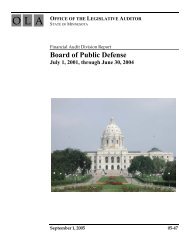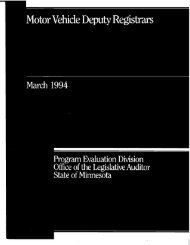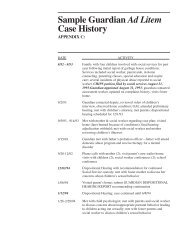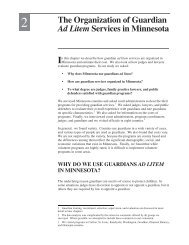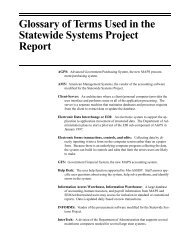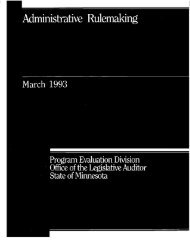Occupational Regulation - Office of the Legislative Auditor
Occupational Regulation - Office of the Legislative Auditor
Occupational Regulation - Office of the Legislative Auditor
Create successful ePaper yourself
Turn your PDF publications into a flip-book with our unique Google optimized e-Paper software.
APPENDIX B 97<br />
A 1997 legislative proposal, H.F. 885/S.F. 303, backed by <strong>the</strong> Minnesota Chapter<br />
<strong>of</strong> <strong>the</strong> American Physical Therapy Association (APTA), would have placed <strong>the</strong><br />
regulation <strong>of</strong> physical <strong>the</strong>rapists under <strong>the</strong> auspices <strong>of</strong> an independent Board <strong>of</strong><br />
Physical Therapy. 19 The proposal was eventually incorporated into <strong>the</strong> Health and<br />
Human Services omnibus bill that passed through <strong>the</strong> House <strong>of</strong> Representatives.<br />
However, in conference committee <strong>the</strong> proposal was replaced by a study. The<br />
Health Department is currently convening “a workgroup to study <strong>the</strong> feasibility<br />
and need <strong>of</strong> creating a separate Board <strong>of</strong> Rehabilitation Therapy Occupations,<br />
including physical <strong>the</strong>rapists, occupational <strong>the</strong>rapists, speech language<br />
pathologists, audiologists, hearing instrument dispensers, and any o<strong>the</strong>r related<br />
occupation group that <strong>the</strong> commissioner determines should be included.” 20 The<br />
Minnesota APTA is frustrated with this development since it perceives <strong>the</strong> study<br />
as unnecessarily delaying <strong>the</strong> creation <strong>of</strong> an independent Board <strong>of</strong> Physical<br />
Therapy.<br />
PLUMBERS AND WATER CONDITIONING<br />
PROFESSIONALS<br />
Plumbers are<br />
licensed by <strong>the</strong><br />
Department <strong>of</strong><br />
Health, but only<br />
need a license to<br />
work in cities <strong>of</strong><br />
5,000 people or<br />
more.<br />
Plumbers are regulated because <strong>of</strong> <strong>the</strong> health and safety issues that surround<br />
municipal water and sewer systems. Journeymen plumbers are licensed in 29<br />
states and water conditioning installers, involved in <strong>the</strong> installation <strong>of</strong> water<br />
s<strong>of</strong>teners, are licensed in only two states: Minnesota and North Dakota. 21 In<br />
Minnesota, plumbers and water conditioning pr<strong>of</strong>essionals are licensed by <strong>the</strong><br />
Environmental Health Services Division <strong>of</strong> <strong>the</strong> Minnesota Department <strong>of</strong> Health,<br />
but only required to have a state license when working in cities <strong>of</strong> 5,000 or more. 22<br />
The distinction between small and larger cities is not related to any public<br />
purpose, but has remained in statute since 1933 largely because <strong>of</strong> <strong>the</strong> vested<br />
interests <strong>of</strong> various plumbing and water conditioning businesses, unions, and<br />
pr<strong>of</strong>essional organizations.<br />
Recent legislative proposals, H.F. 1795/S.F. 1597 for plumbers and H.F. 3244/S.F.<br />
2857 for water conditioning contractors, would have required state wide licensure<br />
<strong>of</strong> both plumbers and water conditioning contractors. Nei<strong>the</strong>r received hearings.<br />
These proposals were not put forward by <strong>the</strong> Department <strong>of</strong> Health, but <strong>the</strong><br />
department has supported state wide licensing <strong>of</strong> plumbers since at least <strong>the</strong> early<br />
1990s when it was involved with a working group on plumbing and water safety<br />
issues. In 1991 this working group forwarded a proposal for state wide licensure<br />
19 The proposal also included a language change which would replace <strong>the</strong> term “certificate <strong>of</strong><br />
registration” with “license.” This language change could have caused some confusion; although<br />
under Minn. Stat. §214 licensure is a level <strong>of</strong> regulation reserved for practice protection, <strong>the</strong> proposal<br />
would not have actually changed <strong>the</strong> current level <strong>of</strong> regulation, only <strong>the</strong> terminology.<br />
20 Minn. Laws (1998), ch. 407, art. 2, sec. 108.<br />
21 Master plumbers are licensed in 23 states and apprentices are licensed in 8, registered in 9.<br />
Smith-Peters, The Directory <strong>of</strong> Pr<strong>of</strong>essional and <strong>Occupational</strong> <strong>Regulation</strong> in <strong>the</strong> United States.<br />
22 “Plumbers” includes master plumbers, journeyman plumbers, and apprentices. Apprentices<br />
are not licensed but registered. Water conditioning installers include both installers and contractors.<br />
In cities <strong>of</strong> 5,000 or more water conditioning installers are limited to working on one- or<br />
two-family dwellings.



